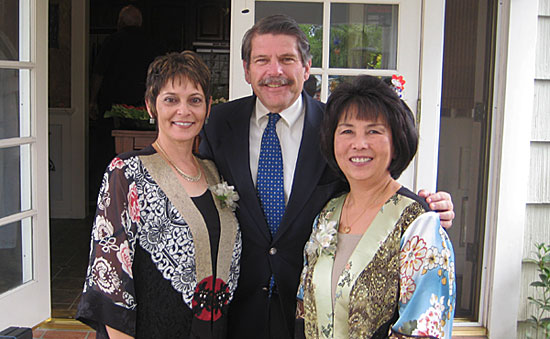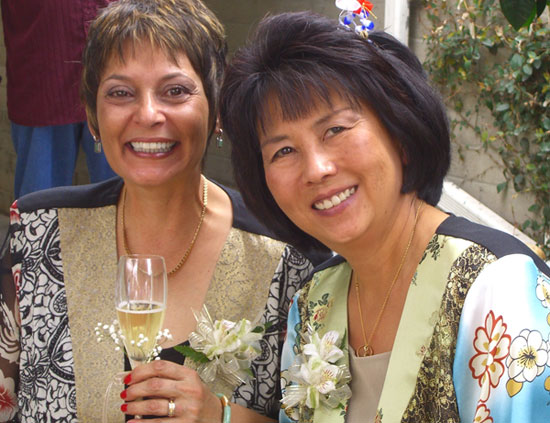Vowing a fairer future
March 27, 2013

In October 2008, Supervisor Yaroslavsky officiated at the marriage of Rita Romero, left, and June Lagmay.
During my many years in public life, there’ve been just a handful of times when I’ve been caught off guard.
This week, as the U.S. Supreme Court heard arguments on the constitutionality of California’s voter-imposed ban on same-sex marriage, I thought back to one of those surprising—and humbling—moments. It came some two decades ago when, as chairman of the Los Angeles City Council’s finance committee, I championed a measure to provide domestic-partner benefits to couples who’d been living together for more than a year.
After the vote, the committee’s clerk asked whether she might speak with me for a moment. By then, the hearing room at City Hall had cleared. It was just the two of us. I figured she had some committee business to discuss. And, in a very deep and unexpected sense, she did. She revealed that she’d been living with a partner, a woman, for nearly 20 years. “I just want you to know,” she said, “that this legislation will improve the quality of our lives in a truly meaningful way. Thank you.” I was overwhelmed. It’s rare that you get to witness such an immediate and profound impact of a vote on a person’s life. That was a good day.
Throughout my career, I’ve worked hard to be a consistent advocate for groups and individuals marginalized by society, including gays and lesbians. From my earliest days on the City Council, I confronted the Los Angeles Police Department for wrongly harassing gays and lesbians. I was the first straight elected official in California to debate then-State Senator John Briggs over his infamous (and doomed) ballot initiative in 1978 that would have prohibited gays and lesbians from teaching in the public schools, a measure ultimately opposed by Ronald Reagan.
But until a decade ago, I didn’t embrace the movement for same-sex marriage. I didn’t see the point. Hadn’t we provided gay and lesbian couples with virtually all the benefits of marriage except a license? With so many other important fights to pick, was this among the most pressing struggles for our society’s well-being?
Then I got educated. I had a conversation with my daughter, one that reminded me of that old Crosby, Stills, Nash & Young song, “Teach Your Children.” In the final refrain, it calls out to the young listeners of the day to “teach your parents well.” And in my home, like millions of others across America, that’s what happened.
“What difference does it make to you, Dad, if same-sex couples want to get married?” asked my daughter, who was then in her 20s. Although it was a simple question, I couldn’t summon a satisfactory answer no matter how hard I tried. The core issue was no different than any other civil rights struggle: a right extended by government to some was being denied to others solely because of sexual orientation, putting it in the same class as other discrimination battles our nation has known all too well.
While some people have described their support of marriage equality as an evolution, it was more like a 180-degree revolution for me after that conversation with my daughter. In the ensuing decade, I’ve supported same-sex marriage and I campaigned against Proposition 8, the California ballot measure now before the Supreme Court.
I’m hoping that the justices go big, that they rule as unconstitutional any laws banning same-sex marriage anywhere in the country. Judging from their questions and observations from the bench this week, most experts think that’s unlikely. Still, I’m keeping my fingers crossed that the court will at least begin to get on the right side of history and strike down California’s Proposition 8, which enshrined discrimination in the state’s constitution.
Maybe if each justice had the chance to preside over a same-sex union, as I have, they’d have a better sense of why Americans increasingly favor marriage equality.
In the fall of 2008, during a five-month window when such marriages were legal in California, I was honored to be asked by June Lagmay and Rita Romero to officiate at their wedding. June was no longer the clerk for the City Council’s finance committee, as she was when we had that private chat in the hearing room so many years ago. She’s now the City Clerk for the City of Los Angeles, and she’d waited a long time to wed her partner of 40 years, a wait that had joyously ended when the California State Supreme Court ruled for marriage equality.
The couple’s home in Temple City was packed with friends and family. There were beautiful rings, champagne toasts and a big layered cake. But most of all there was love, the kind that’s full of understanding and acceptance, a love that’s too powerful to be contained by bigotry and bad laws.
Posted 3/27/13













 405 bridge work causes a stink
405 bridge work causes a stink





